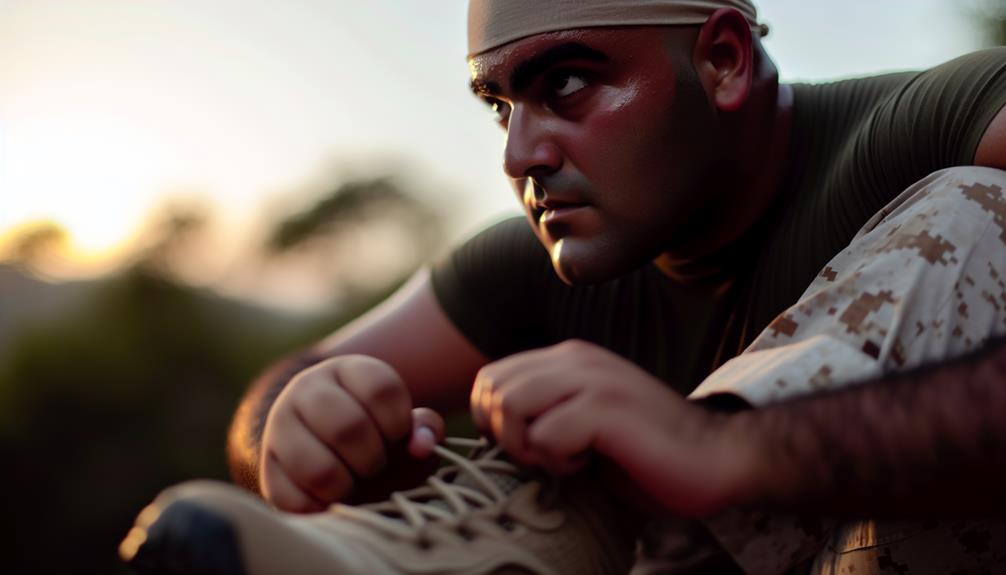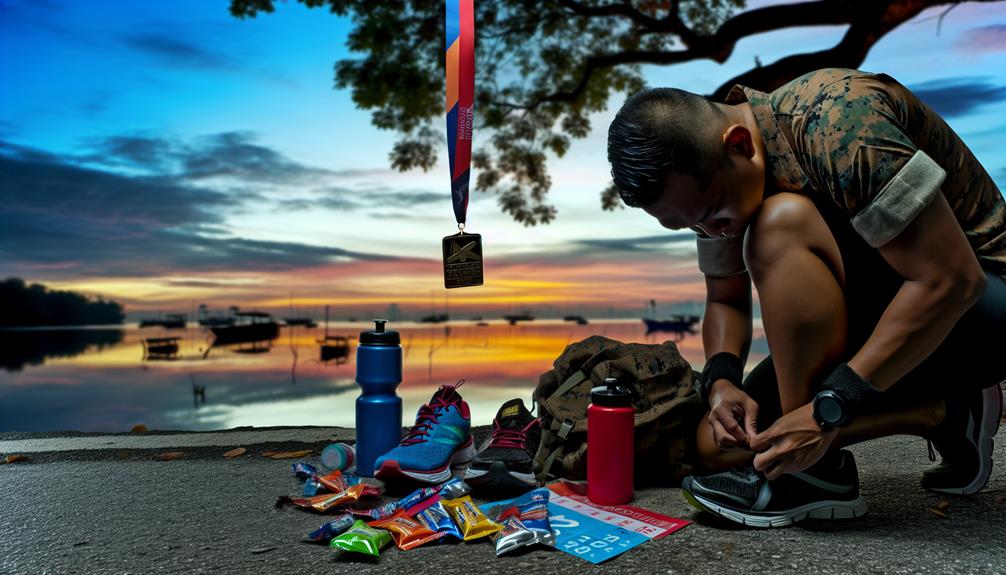This Marine's journey of running 31 marathons in 31 days exemplifies remarkable physical endurance and mental resilience. His structured training regimen, which includes long-distance runs and targeted strength workouts, prepares him for this extraordinary feat. Throughout the challenge, he faces significant physical fatigue, yet employs mindfulness techniques and positive affirmations to cultivate mental toughness. The process fosters camaraderie among fellow Marines and strengthens community ties through supportive engagement. As this Marine inspires others, the lessons gleaned extend beyond athletic achievement, offering insights into the power of teamwork and personal growth. Discover the profound impact of his journey on both himself and the community.
Key Takeaways
- The Marine's journey showcases extraordinary physical endurance and mental resilience, embodying the human spirit's ability to overcome challenges.
- A structured training regimen, including long-distance runs and strength workouts, is crucial for completing 31 marathons in 31 days.
- Community support plays a vital role, with local businesses and participants uniting to foster camaraderie and shared goals during the challenge.
- Mental resilience techniques, such as mindfulness and visualization, are essential for maintaining focus and motivation throughout the grueling marathon series.
- The experience leads to personal growth, emphasizing lessons learned about perseverance, self-compassion, and the importance of community engagement.
The Motivation Behind the Challenge

The impetus for initiating the challenge of completing marathons in 31 days lies not only in the pursuit of physical endurance but also in the exploration of mental resilience. This extraordinary endeavor serves as a powerful demonstration of the human spirit's capacity to overcome limitations and redefine personal goals. Individuals who undertake such a journey often do so driven by intrinsic motivation, a deep-seated desire to achieve something meaningful beyond external validation. By embracing challenges, participants can also equip themselves with essential skills that enhance their overall performance, much like how unlocking academic success can lead to improved outcomes.
The challenge of running a marathon each day for an entire month compels participants to confront their psychological barriers, fostering a sense of belonging within a community of like-minded individuals. This shared experience creates bonds among runners, reinforcing the understanding that they are not alone in their struggles. Embracing vulnerability in the face of adversity can cultivate a profound sense of purpose and fulfillment.
Moreover, this pursuit highlights the importance of setting personal goals that resonate with one's core values, emphasizing the transformative power of commitment and perseverance. As runners navigate the physical and mental obstacles presented by this challenge, they ultimately discover not just their limits, but also the strength that lies in unity and resilience.
Training Regimen and Preparation
To successfully tackle the challenge of completing marathons in 31 consecutive days, a well-structured training regimen is crucial. This Marine understood that physical endurance alone would not suffice; meticulous hydration strategies and nutrition planning were pivotal components of his preparation. The importance of maintaining overall health and wellness during intense training cannot be overstated, as seen in the thorough healthcare services offered by organizations like Syracuse Community Health Center.
Training began months in advance, incorporating a blend of long-distance runs, interval training, and strength workouts to build both stamina and resilience. Each run was carefully calculated, progressively increasing mileage to allow the body to adapt to the stress of daily marathons.
Hydration strategies were tailored to guarantee peak performance. The Marine tested various electrolyte solutions and water intake schedules to determine what best supported his body during rigorous training sessions. This proactive approach not only mitigated the risk of dehydration but also enhanced recovery times.
Nutrition planning was equally critical. A balanced diet rich in carbohydrates, proteins, and healthy fats was prioritized, emphasizing whole foods to fuel the body efficiently. Meal prepping became a routine, guaranteeing that nutrient-dense meals were readily available, thereby eliminating potential distractions during training. This extensive approach to preparation laid the groundwork for success, fostering a sense of community among fellow endurance enthusiasts who shared similar goals.
Daily Routine During the Marathons

Completing a marathon every day for 31 consecutive days requires a meticulously organized daily routine that balances physical exertion with recovery and nutrition. The success of this ambitious endeavor hinges on a well-structured approach that guarantees peak performance and well-being. For those looking for inspiration on managing rigorous schedules, remote customer service jobs offer flexible work options that can complement such intense training.
Key components of the daily routine include:
- Morning Rituals: Each day starts with a consistent set of morning rituals, including mindfulness exercises and dynamic stretching to prepare both body and mind for the day's challenge.
- Hydration Strategies: Effective hydration is critical. The marine incorporates a tailored hydration plan, consuming fluids at regular intervals throughout the day, and replenishing electrolytes post-run to maintain peak performance.
- Nutrition Focus: Meal planning is essential, with an emphasis on nutrient-dense foods that provide sustained energy. Balanced meals rich in carbohydrates, proteins, and healthy fats are consumed at strategic times to fuel the body.
- Recovery Practices: Post-marathon recovery includes foam rolling, gentle yoga, and adequate sleep, allowing muscles to repair and rejuvenate for the next day's race.
This structured routine not only enhances physical endurance but also fosters a sense of community and belonging among fellow runners, united by shared goals.
Physical and Mental Struggles
The journey of completing marathons in consecutive days presents significant physical and mental challenges that require careful navigation. Endurance training often reveals the limits of physical capability, while mental resilience techniques become essential tools for coping with the inevitable pain and fatigue. Exploring strategies for overcoming these struggles can illuminate the intricate balance between body and mind in the pursuit of marathon success.
Endurance Training Challenges
Steering through the complexities of endurance training reveals a myriad of physical and mental challenges that can test even the most dedicated athletes. As participants commence on the arduous journey of completing 31 marathons in 31 days, they encounter obstacles that require not only strength but also resilience and strategy.
- Physical Fatigue: The relentless nature of consecutive marathons places immense strain on the body, leading to muscle soreness and exhaustion that can hinder performance.
- Nutrition Strategies: Proper fueling is essential; athletes must meticulously plan their nutrition to guarantee they have the energy needed to sustain their training without compromising recovery.
- Mental Fatigue: The psychological toll of daily running can be intimidating, as athletes must confront self-doubt and maintain motivation through adversity.
- Recovery Techniques: Implementing effective recovery strategies, such as hydration, stretching, and rest, becomes paramount in preventing injuries and enhancing performance.
Navigating these challenges fosters a deeper sense of community among athletes, uniting them in their pursuit of endurance and personal growth. Each struggle serves as a proof of their commitment, reinforcing the belief that they are not alone on this demanding journey.
Mental Resilience Techniques
Developing mental resilience is crucial for athletes undertaking the challenge of running 31 marathons in 31 days, as it equips them to navigate both physical and psychological hardships. The ability to maintain focus and composure during this grueling endeavor is paramount. Mindfulness practices, such as deep-breathing exercises and meditation, allow runners to center their thoughts, helping them remain present and reduce anxiety during each marathon.
Visualization techniques further enhance mental resilience by enabling athletes to mentally rehearse their performance, creating a strong mental image of success. This practice fosters a sense of control and preparedness, essential for overcoming the intimidating nature of daily marathons. Coupled with positive affirmations, these techniques cultivate a strong self-belief, allowing athletes to silence self-doubt and bolster confidence.
Effective stress management strategies are also crucial for maintaining mental clarity. By establishing routines that incorporate breaks for relaxation and reflection, runners can mitigate the cumulative toll of fatigue. Collectively, these mental resilience techniques not only empower athletes to face the physical challenges ahead but also foster a supportive community where shared experiences and encouragement can thrive.
Overcoming Physical Pain
Amid the relentless pursuit of completing 31 marathons in 31 days, athletes inevitably confront the dual specters of physical pain and mental struggle. This journey demands not only rigorous training but also effective strategies for pain management and injury prevention. Understanding the body's signals and employing proactive measures can make the difference between triumph and defeat.
- Listening to Your Body: Athletes must remain attuned to their physical state, recognizing when to push through discomfort and when to rest, ensuring long-term success.
- Cross-Training: Incorporating alternative exercises can alleviate stress on specific muscle groups, enhancing overall fitness while reducing the risk of injury.
- Rest and Recovery: Prioritizing sleep and recovery days allows the body to heal and rejuvenate, which is essential in a grueling marathon schedule.
- Mental Fortitude: Developing mental resilience techniques, such as visualization and positive affirmations, helps athletes navigate the inevitable pain, reinforcing a sense of belonging within the running community.
Support From Fellow Marines

Support from fellow Marines plays an essential role in the success of any marathon training regimen, particularly when the goal is to complete an ambitious challenge like running multiple marathons in 31 days. The essence of team camaraderie fosters a supportive environment that encourages individual perseverance, transforming intimidating distances into achievable milestones. This collective effort mirrors the way P. Diddy's influence in music and fashion inspires others to aim for greatness.
Shared experiences among Marines not only enhance physical training but also fortify emotional resilience. The collective spirit cultivated through mutual encouragement serves as a significant motivator, enabling participants to push through the inevitable fatigue and discomfort that accompany such an intensive endeavor. When one Marine falters, others step in, offering words of motivation or pacing alongside them, creating a sense of unity that transcends the challenges of distance running.
Moreover, the bonds formed during training sessions extend beyond the physical act of running. They create lasting relationships rooted in trust and shared goals, reinforcing the idea that each member contributes to the collective success. In this context, the act of running marathons transforms from a personal challenge into a powerful representation of teamwork, resilience, and the unwavering support that exemplifies the Marine Corps ethos.
Impact on the Community
The organization of marathons over 31 days not only showcases athletic endurance but also serves as a catalyst for community engagement and support initiatives. Local businesses, such as Peoples Bank, often participate by sponsoring events or offering resources, which strengthens the bond between residents and local establishments. By fostering local participation, these events encourage residents to unite in a shared goal, promoting health and camaraderie. Ultimately, the positive ripple effects extend beyond the races, enhancing community spirit and cohesion.
Community Support Initiatives
Community support initiatives surrounding marathons have emerged as essential catalysts for local engagement and development. These initiatives not only unite community members but also foster a sense of belonging through various collaborative efforts. The impact is profound, as they create a support network that uplifts both participants and spectators alike.
Key components of these initiatives include:
- Fundraising Efforts: Marathons often serve as platforms for raising funds for local charities, ensuring that financial support reaches those in need.
- Volunteer Involvement: Community members actively participate as volunteers, strengthening ties and enhancing their investment in local causes.
- Local Sponsorships: Businesses collaborate to sponsor events, showcasing their commitment to the community while boosting their visibility and reputation.
- Awareness Campaigns: These events raise awareness about various social issues, encouraging community outreach and dialogue around significant topics.
Through strategic engagement strategies, marathons create charity partnerships that not only benefit local organizations but also instill a sense of pride and collective achievement in the community, ultimately transforming marathons into powerful vehicles for social change.
Inspiring Local Participation
Encouraging local participation in marathons serves as an essential conduit for enhancing community spirit and fostering a collective sense of ownership. By promoting local involvement, communities can leverage the enthusiasm generated by these events to strengthen social ties and build a supportive environment. Running clubs often emerge as significant hubs for communal engagement, uniting individuals of all ages and abilities while offering structured training and camaraderie.
The organization of community events, such as fitness workshops, not only enhances health awareness but also provides avenues for youth engagement. These workshops can instill lifelong healthy habits, empowering the next generation to embrace active lifestyles. Additionally, volunteering opportunities during marathons allow residents to contribute meaningfully, creating a shared purpose that resonates within the community.
Marathon sponsorship plays a pivotal role in funding these initiatives, enabling fundraising efforts that benefit local charities and causes. Inspirational stories from participants further enrich the narrative, serving as motivation for others to join in. Collectively, these elements illustrate how marathons can transcend mere athletic endeavors, becoming catalysts for community cohesion and resilience, while inspiring individuals to connect, contribute, and thrive together.
Lessons Learned Through Endurance

While the physical toll of running multiple marathons in a month can be formidable, the mental and emotional lessons gleaned from such an endeavor are equally profound. Endurance challenges not only test physical limits but also foster a deeper understanding of oneself. The journey illustrates essential strategies for personal growth and resilience.
- Mindful Breathing: Engaging in mindful breathing techniques enhances focus and reduces anxiety, allowing runners to remain present during the arduous miles.
- Goal Setting: Establishing clear, attainable goals transforms challenging tasks into manageable steps, fostering a sense of accomplishment.
- Reflective Journaling: Documenting experiences through reflective journaling promotes emotional awareness and self-compassion, helping individuals process their thoughts and feelings throughout the journey.
- Positive Affirmations: Utilizing positive affirmations reinforces a growth mindset, boosting confidence and motivation when faced with challenges.
Incorporating these strategies not only aids in performance tracking and stress management but also cultivates a sense of belonging within the running community. Ultimately, the lessons learned through endurance extend far beyond the physical domain, enriching both personal and collective experiences.
Frequently Asked Questions
What Inspired the Marine to Choose 31 Marathons Specifically?
The choice of completing 31 marathons likely stems from a deep-seated marathon motivation, reflecting a commitment to extraordinary endurance training. This ambitious challenge not only pushes physical limits but also serves to inspire others within the community. By selecting 31, the Marine connects to a broader narrative of resilience, encouraging a sense of belonging among fellow athletes who endeavor for excellence. Such endeavors exemplify the power of the human spirit in overcoming obstacles together.
How Did the Marine Fund the Marathon Challenge?
To fund the marathon challenge, the Marine implemented various fundraising strategies that included engaging the community and leveraging social media platforms. By identifying sponsorship opportunities with local businesses, he created partnerships that not only provided financial support but also fostered community involvement. These collaborative efforts not only guaranteed the challenge's feasibility but also inspired others to contribute, reinforcing a sense of belonging and collective purpose within the community throughout the journey.
Were There Any Injuries During the Marathon Series?
During the marathon series, managing the risk of injuries was paramount. Effective injury prevention strategies, such as tailored training regimens and proper footwear, were essential in minimizing strain. Additionally, the implementation of recovery strategies, including hydration, nutrition, and stretching, played an important role in maintaining physical health throughout the challenge. Engaging in these best practices not only safeguarded against potential injuries but also fostered a sense of community among participants committed to endurance and resilience.
What Was the Marine's Diet During the 31 Days?
The marine's diet during the 31-day marathon series was meticulously planned, emphasizing nutritional strategies to sustain energy levels and promote recovery. Meal planning likely included a balance of carbohydrates for energy, proteins for muscle repair, and healthy fats for overall health. Hydration was also critical, ensuring peak performance. Incorporating nutrient-dense foods, such as fruits, vegetables, and whole grains, would have supported the rigorous demands of daily marathoning, showcasing the importance of proper nutrition in endurance sports.
How Did the Challenge Affect the Marine's Personal Life?
The challenge considerably impacted the marine's personal life, reshaping family dynamics and fostering a deeper emotional resilience. Balancing rigorous training and marathon commitments often strained relationships, yet it also created opportunities for family engagement and support. The experience encouraged open communication and mutual understanding, as loved ones rallied around shared goals. Ultimately, this endeavor not only tested physical limits but also strengthened familial bonds, reinforcing a sense of belonging within the family unit.

